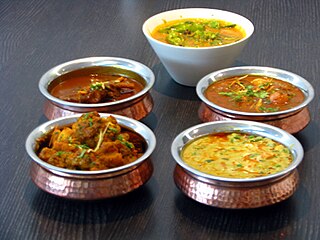
Curry is a dish with a sauce seasoned with spices, mainly associated with South Asian cuisine. It is not to be confused with leaves from the curry tree, though some curries do include curry leaves. Curry is also found in the native cuisines of many South East Asian and East Asian countries due to ancient contact with South Asia.

English cuisine encompasses the cooking styles, traditions and recipes associated with England. It has distinctive attributes of its own, but is also very similar to wider British cuisine, partly historically and partly due to the import of ingredients and ideas from the Americas, China, and India during the time of the British Empire and as a result of post-war immigration.

Kedgeree is a dish consisting of cooked, flaked fish, boiled rice, parsley, hard-boiled eggs, curry powder, lemon juice, sea salt, butter or cream, and occasionally sultanas.

Chicken tikka masala is a dish consisting of roasted marinated chicken chunks in a spiced sauce. The sauce is usually creamy and orange-coloured. The dish was popularised by cooks from India living in Great Britain and is offered at restaurants around the world.

Vindaloo or Vindalho is an Indian curry dish, originally from Vasai and Goa.
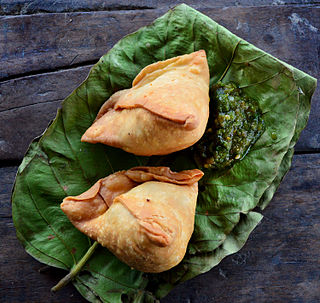
A samosa is a fried central Asian pastry with a savoury filling, including ingredients such as spiced potatoes, onions, peas, meat, or fish. It is made into different shapes, including triangular, cone, or crescent, depending on the region. Samosas are often accompanied by chutney, and have origins in medieval times or earlier. Sweet versions are also made. Samosas are a popular entrée, appetizer, or snack in the cuisines of South Asia, the Middle East, Central Asia, East Africa and their South Asian diasporas.
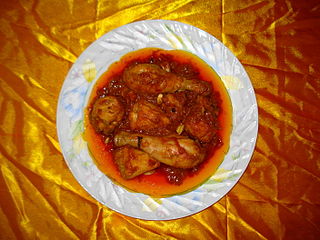
Korma or qorma ; Persian: قرما); is a dish with its origin in the Indian subcontinent, consisting of meat or vegetables braised with yogurt (dahi), water or stock, and spices to produce a thick sauce or gravy.

Butter chicken, traditionally known as murgh makhani, is an Indian dish originating in Delhi. It is a type of curry made from chicken with a spiced tomato and butter (makhan) sauce. Its sauce is known for its rich texture. It is similar to chicken tikka masala, which uses a tomato paste.
Anglo-Indian cuisine is the cuisine that developed during the British Raj in India. The cuisine introduced dishes such as curry, chutney, kedgeree, mulligatawny and pish pash to English palates.

Fish head curry is a dish in Indonesian, Malaysian and Singaporean cuisines with mixed Indian and Chinese origins. The head of a red snapper is stewed in a Kerala-style curry with assorted vegetables such as okra and eggplants. It is usually served with either rice or bread, or as a shared dish.

Jalfrezi is a stir-fried curry dish originating in Bengal and popular throughout South Asia. Jalfrezi means "hot-fry". It consists of a main ingredient such as meat, fish, paneer or vegetables, stir-fried and served in a thick spicy sauce that includes green chilli peppers. Common further ingredients include bell peppers, onions and tomatoes.

Indian Chinese cuisine, Chinese Indian cuisine, Sino-Indian cuisine, Chindian cuisine, Hakka Chinese or Desi-Chinese cuisine is a distinct style of Chinese cuisine adapted to Indian tastes, combining Chinese foods with Indian flavours and spices. Though Asian cuisines have mixed throughout history throughout Asia, the most popular origin story of the fusion food resides with Chinese labourers of Calcutta, who immigrated to British Raj India looking for work. Opening restaurant businesses in the area, these early Chinese food sellers adapted their culinary styles to suit Indian tastes.

Country captain is a curried chicken and rice dish, which is popular in the Southern United States. It was introduced to the United States through Charleston, Savannah, New York City, and Philadelphia, but has origins in the Indian subcontinent. The dish was also included in the U.S. military's Meal, Ready-to-Eat packs from 2000 to 2004, in honor of it being a favorite dish of George S. Patton.
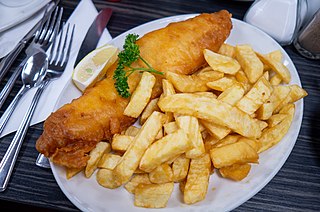
British cuisine is the specific set of cooking traditions and practices associated with the United Kingdom, including the cuisines of England, Scotland, Wales and Northern Ireland. According to food writer Colin Spencer, historically, British cuisine meant "unfussy dishes made with quality local ingredients, matched with simple sauces to accentuate flavour, rather than disguise it".
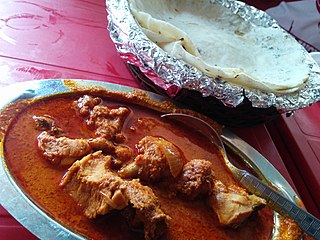
Chicken curry or curry/curriedchicken is a South Asian dish originating from India. It is common in the Indian subcontinent, Caribbean, Arabian Peninsula, Southeast Asia, Great Britain, and Japan. A typical curry from the Indian subcontinent consists of chicken stewed in an onion- and tomato-based sauce, flavoured with ginger, garlic, tomato puree, chilli peppers and a variety of spices, often including turmeric, cumin, coriander, cinnamon, and cardamom. Outside of South Asia, chicken curry is often made with a pre-made spice mixture known as curry powder.
British Bangladeshis are people who arrived from Bangladesh to the United Kingdom, and throughout the years have started to create new businesses throughout the country, especially in Brick Lane, where there are many Bangladeshi restaurants. Bangladeshis were the first to have started the curry industry in the UK, from small businesses. The curry is now regarded as Britain's National dish. Many others also own supermarket stores specialising in Bangladeshi products, and also in the media, the main Bengali channels - Bangla TV and Channel S.

Tunku Varadarajan is a India-born naturalised British writer and journalist, formerly editor of Newsweek Global and Newsweek International. He is a fellow at the American Enterprise Institute, to which he has been affiliated since February 2021. He is also a fellow at the Classical Liberal Institute at New York University Law School , and at the Center on Capitalism and Society at Columbia University. He is a contributor under contract to The Wall Street Journal, where he writes Weekend Interviews and Book Reviews for the editorial page. He was earlier the Virginia Hobbs Carpenter Research Fellow in Journalism at the Hoover Institution at Stanford University, and a contributing editor at Politico Europe.

Shrabani Basu is an Indian journalist and historian, best known for writing Spy Princess (2006), an account of the life of Noor Inayat Khan, and Victoria & Abdul (2010), based on the friendship between Queen Victoria and Abdul Karim. She later compiled the stories of Indian men sent to Europe in the First World War, in For King and Another Country (2015). In The Mystery of the Parsee Lawyer (2021), she showed how Arthur Conan Doyle proved the innocence of George Edalji, an Indian lawyer in early twentieth century Midlands, England.

Victoria & Abdul: The True Story of the Queen's Closest Confidant is a book about Queen Victoria and her Munshi Abdul Karim, researched and written by Shrabani Basu, published by The History Press in 2010, and adapted to produce the feature film Victoria & Abdul in 2017.

Curry, a spicy South Asian-derived dish, is a popular meal in the United Kingdom. Curry recipes have been printed in Britain since 1747, when Hannah Glasse gave a recipe for a chicken curry. In the 19th century, many more recipes appeared in the popular cookbooks of the time. Curries in Britain are widely described using Indian terms, such as korma for a mild sauce with almond and coconut, Madras for a hot, slightly sour sauce, and pasanda for a mild sauce with cream and coconut milk. One type of curry, chicken tikka masala, was created in India, but has become widespread enough to be described as the national dish of the United Kingdom.

















